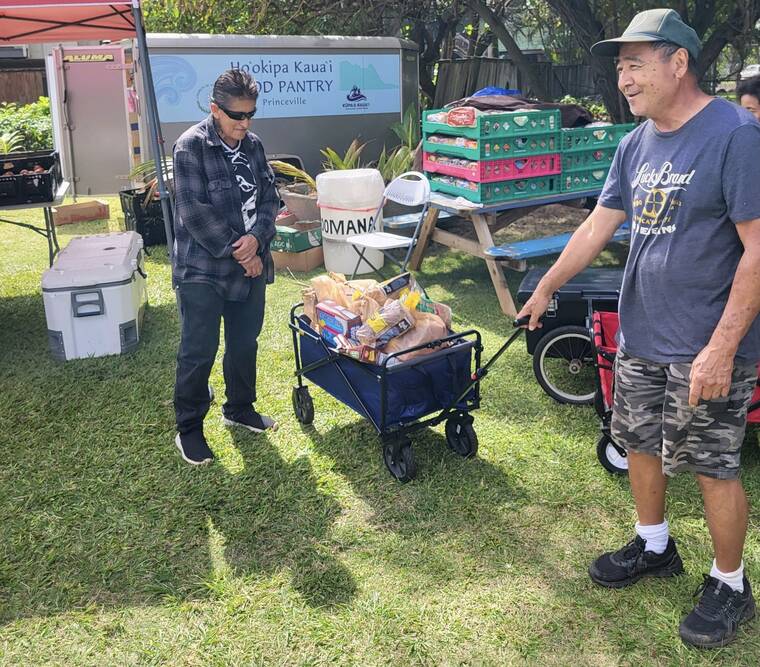End of pandemic-era SNAP benefits hits Kaua‘i’s food insecure
LIHU‘E — Low-income households relying on food stamps will have significantly less money to spend on groceries, as Congress phases out a major pandemic-era financial assistance program.
In response to the economic fallout of the COVID-19 pandemic, Congress passed the Families First Coronavirus Response Act in late March 2020, temporarily boosting food stamp benefits.
However, that act expired on Wednesday, leaving those reliant on it with significantly less money to purchase groceries.
On average, individuals enrolled in the Supplemental Nutrition Assistance Program, or SNAP, will receive about $90 less this month. Some households will lose as much as $250 or more in benefits, according to the Center on Budget and Policy Priorities, a public policy think tank.
For Kaua‘i — where the U.S. Census Bureau estimates 14 percent of households received these benefits in 2021 — the effects will be felt island-wide, particularly as inflation continues to increase food prices.
“There’s a lot of people that are having to pick and choose,” said Rowena Contrades-Pangan, executive director at Ho‘omana Thrift Store in Wailua. “Are they gonna pay rent? Pay for the utilities? Are they gonna buy food?”
Contrades-Pagnan continued, mentioning that balancing money has been difficult for many in recent years, even with the additional SNAP benefits.
“I had a grandma (tell me), ‘Do I pick up food for myself, or do I pick up my medicine?’” she said. “She said after her food stamps run out — it lasts for maybe two weeks — after that, she’s just scraping by.”
As SNAP recipients grapple with this loss in funds, many individuals are expected to replace fresh meat and produce purchases with cheaper, longer-lasting foods, such as rice and canned goods.
However, Stormy Soza, food access manager at local food-oriented nonprofit Malama Kaua‘i, notes that even though these foods may be cheaper at the register, they come with their own price.
“When we’re having to substitute with those other shelf-stable products, people feel that,” she said. “Not just gaining weight because the food is just empty calories or food that doesn’t really meet our nutritional goals, but they feel it physically. They’re going to the doctor, they’re experiencing chronic diseases, obesity, overweight.”
She continued, “This is a different price tag. It doesn’t cost money at the grocery store, but it’s gonna cost money at the doctor’s. They’re experiencing all of these chronic diseases because of the diet that they can ‘afford.’ But when we look at those long-term ramifications from the poor diet, it is costly.”
Above all, Soza is concerned for the impact this shift in diet could have for Kaua‘i’s keiki.
Of the island’s 3,294 households estimated to have received food stamps in 2021, more than 1,400 contained children under 18 years of age, according to the U.S. Census Bureau.
And according to The Pantry, a Hawai‘i based nonprofit food distribution service, approximately 1 in 3 of Kaua‘i’s keiki are projected to be food insecure.
Poor diets put children at risk of poor brain development, weak learning, low immunity to disease and increased infections.
Research by Children’s HealthWatch has also found that food-insecure children ages 6 to 11 scored lower on intelligence tests, had a harder time getting along with others, were more likely to have repeated a grade, and had lower general achievement test scores than their food-secure peers.
“Especially (for) our families with young children that are developing still, and require these nutrients to grow, it is a troubling thing to think about,” Soza said.
As Congress phases out these pandemic-era SNAP funds, Kelvin Moniz, executive director at Kaua‘i Independent Food Bank, says he anticipates a significant uptick in household reliance on food banks and food pantries.
“The need is going to be more drastically high,” he said. “If they’re gonna get a drop in food stamps in the SNAP program, then yes, I think our number’s really gonna go up in how many people we’re going to serve.”
While Contrades-Pangan says the Ho‘okipa Kaua‘i Food Pantry — which she runs alongside the Church of the Pacific — has been able to meet demand thus far, she acknowledges that demand for the pantry’s limited resources is growing.
“We just have what we have, and we share what we have,” she said. “Thank God we haven’t run out yet, but we see our food pantry growing rapidly. Through word of mouth, people are finding out about us — people are starving.”
•••
Jackson Healy, reporter, can be reached at 808-647-4966 or jhealy@thegardenisland.com.


Kauai Ohana : Please remember to visit the Kauai Independent Food Bank if you need food assistance. Proteins, fruits, vegetables, dairy, and shelf stable items are available. No income requirements. Distributions are 2nd and 4th Wednesdays 10am-1pm at 3285 Waapa RD Lihue. You can also come anytime 8a-4p Mon-Fri for urgent or emergency food needs.